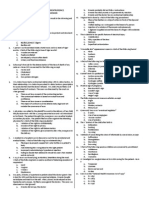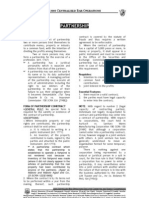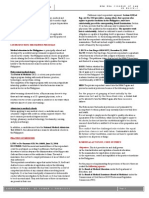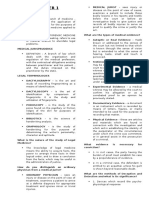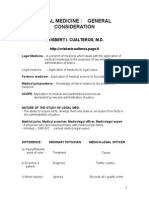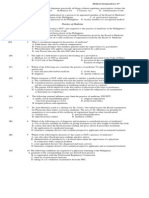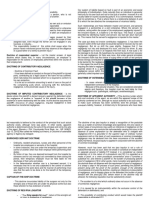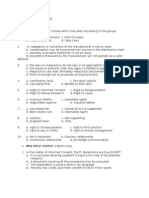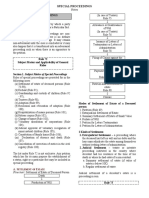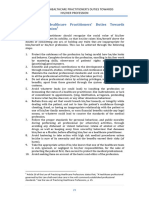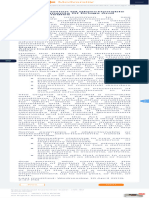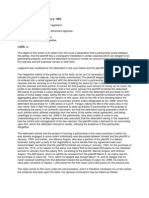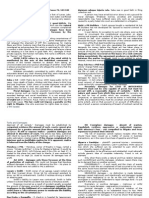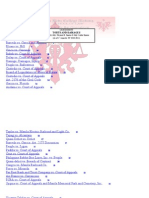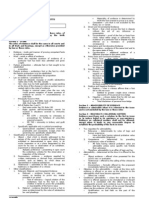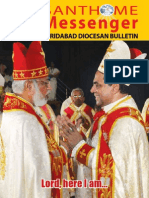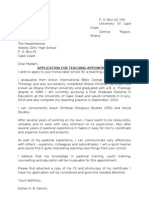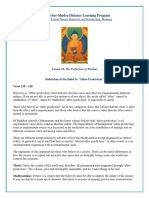Legal Medicine
Legal Medicine
Uploaded by
Jamie TiuCopyright:
Available Formats
Legal Medicine
Legal Medicine
Uploaded by
Jamie TiuOriginal Description:
Copyright
Available Formats
Share this document
Did you find this document useful?
Is this content inappropriate?
Copyright:
Available Formats
Legal Medicine
Legal Medicine
Uploaded by
Jamie TiuCopyright:
Available Formats
PRACTICE OF MEDICINE (extended version)
LECTURER: Dr. Anthony Reboso
LEGEND:
Normal font Italicized font Audio/PowerPoint Books (Solis & Maligaya)
DATE: July 7, 2010
BY DECISION OF COURT are not considered to constitute practice of medicine: 1) One who TAKES BP READING (those who take BP and also suggests medication in relation to the BP reading constitutes the practice of medicine.) 2) The use of an ELECTRIC VIBRATOR and SUN RAY LAMP by an UNLICENSED PERSON. 3) The use of an ELECTRIC MACHINE by BARBERS in giving treatment to one who SOUGHT TO BEAUTIFY HIS BODY RATHER THAN TO SECURE TREATMENT OF A DISEASE OR DEFORMITY. 4) Application of MEDICATED MASSAGE by a duly registered masseur or physiotherapist (i.e. sauna). 5) HOSPITAL Not a natural person but a JURIDICAL PERSON, a corporation, thus incapable of practicing medicine. (for a more detailed discussion, see Only Natural Persons can Practice Medicine, p3) Does not have the duty to treat the patient, it is the sole duty (contract) of the physician to treat the patient. THREE-FOLD DUTY of a hospital: Provide VENUE and BUILDING Provide EQUIPMENT Provide PERSONNEL INDEPENDENT CONTRACTOR THEORY - A patient entering a hospital does not enter into contract with the hospital but with the physician who treats him. The physician is beyond control of the hospital in so far as the manner of treatment to the patient concerned. 6) NURSE ANESTHETIST (a nurse who had special training in anesthesia that carries out the order of the anesthesiologist, although they themselves cannot give out the orders.) B. Who shall, by means of SIGNS, CARDS, ADVERTISEMENT, WRITTEN or PRINTED MATTER, or through the RADIO or TELEVISION or any OTHER MEANS OF COMMUNICATION, either OFFER or UNDERTAKE by any means or methods to DIAGNOSE, TREAT, OPERATE, or PRESCRIBE any remedy for any HUMAN DISEASE, INJURY, DEFORMITY, PHYSICAL, MENTAL or PHYSICAL CONDITION. In the OLD CODE OF ETHICS, false, extravagant, and unethical advertisements shall not be allowed. 1) FALSE ADVERTISEMENTS Advertising something that you are not 2) UNETHICAL / EXTRAVAGANT ADVERTISEMENTS We doctors are allowed to advertise ONLY in the YELLOW PAGES and in the CLASSIFIED ADS, but the advertisement should only be limited to what we can put in our CALLING CARD or SIGNBOARDS (2 x 3 ft.), billboards are not allowed. NAME (may include titles, degrees, fellowships, etc.), LINE OF WORK (specialty), CONTACT NUMBERS, and APPOINTMENT or HOSPITAL AFFILIATIONS. Adjectives and/or superlatives use to describe oneself are prohibited. Anything otherwise stated above are UNETHICAL, NOT UNLAWFUL. In the NEW CODE OF ETHICS, passed by the Philippine Medical Association (PMA), physicians are now ALLOWED TO HAVE THEIR OWN WEBSITE; wherein, putting QUALIFICATIONS and TRAININGS are permitted.
Disclaimer: this transcription is an extended version of what should have been the original transcription of July 7s legal medicine lecture. Ms Sheena and I decided not to release this transcription right away without incorporating the rest of the topics not discussed but were in the book of Solis. Sorry for the delay.
PRACTICE OF MEDICINE
- a PRIVILEGE or FRANCHISE (not a right) granted by the state to any person to perform medical acts UPON COMPLIANCE WITH LAW (the state has the right to exercise police power to protect its citizenry from unqualified practitioners of medicine.), that is, the MEDICAL ACT OF 1959 as amended (R.A. 2382) which has been promulgated by the State in the exercise of police power to protect.
Sec.10 Acts Constituting Practice of Medicine
A. Who shall, for COMPENSATION, FEE, SALARY or REWARD IN ANY FORM, PAID TO HIM DIRECTLY OR THROUGH ANOTHER, or EVEN WITHOUT THE SAME, PHYSICALLY EXAMINE any person, AND DIAGNOSE, TREAT, OPERATE, or PRESCRIBE ANY REMEDY for any HUMAN DISEASE (physicians are NOT forbidden to treat animals provided that no compensation is done, otherwise they will be charge of illegal practice of veterinary medicine), INJURY, DEFORMITY (i.e. dermatology & plastic surgery), PHYSICAL, MENTAL or PHYSICAL CONDITION or any AILMENT, REAL or IMAGINARY (i.e. psychiatry), regardless of the nature of the remedy of treatment ADMINISTERED, PRESCRIBED or RECOMMENDED From the above provision, the following acts constitute the practice of medicine: 1) Physically examine a person AND diagnose; 2) Physically examine a person AND treat; 3) Physically examine a person AND operate; and 4) Physically examine a person AND prescribe any remedy. BY PROVISION OF LAW not considered to constitute practice of medicine: 1) Any MEDICAL STUDENT DULY ENROLLED IN AN APPROVED MEDICAL COLLEGE (should be under the DIRECT CONTROL AND SUPERVISION OF REGISTERED DOCTOR-TEACHERS) 2) Registered DENTIST (prescriptions should be done within the limits of the practice of dentistry, although OTC prescriptions for systemic conditions cannot be charged. While prescriptions for systemic conditions (i.e. antibiotics) that requires license numbers constitutes illegal practice of medicine.) 3) Registered MASSEUR or PHYSIOTHERAPIST 4) Registered OPTOMETRIST 5) Any person who RENDERS ANY SERVICE GRATUITOUSLY in cases of EMERGENCY OR in places where the services of a PHYSICIAN, NURSE OR MIDWIFE ARE NOT AVAILABLE. 6) Any person who administer or recommends any household remedy as per classification of existing PHARMACY LAWS (sale of sample drugs is prohibited by law.) 7) CLINICAL PSYCHOLOGIST with the prescription and direct supervision of a registered PHYSICIAN 8) PROSTHETIST
TRANSCRIBED BY: Mhyko COPYREAD BY:
Page 1 of 4
Physicians CAN be present themselves as ACTORS or ACTRESSES in ADVERTISEMENTS in promoting GENERIC PRODUCTS ONLY. The CODE OF ETHICS FOR PHYSICIANS DOES NOT HAVE ANY JURISDICTION OVER CORPORATIONS OR GROUPS. Ethics for corporations are different from the ethics for doctors. C. Who shall FALSELY USE the TITLE OF MD (an academic achievement) under his name, shall be considered as engaged in the practice of medicine.
Attached to international bodies to perform certain definite work in the Philippines Commissioned medical officers stationed in the Philippines in their own territorial jurisdiction. EMBASSIES are also considered EXTENSION OF THEIR COUNTRIES Exchange professors in special branches of medicine - BALIKBAYAN PHYSICIANS pursuant to PD 541, ALLOWING FORMER FILIPINO PROFESSIONALS TO PRACTICE THEIR RESPECTIVE PROFESSIONS IN THE PHILIPPINES. Without having to renounce their foreign citizenship provided that they have a good standing prior to their departure from the Philippines and in their adopted country Need to renew your license. Prior to the practice of their professions, they shall have first registered with the Professional Regulation Commission and have paid the proper professional license fee Must be willing to pay income tax here in the Philippines
-
PENALTIES FOR ILLEGAL PRACTICE OF MEDICINE
Sec. 28, Medical Act of 1959 as amended, Penalties p any person found guilty of illegal practice of medicine shall be punished by a FINE OF NOT LESS THAN ONE THOUSAND PESOS NO MORE THAN TEN THOUSAND PESOS WITH SUBSIDIARY IMPRISONMENT IN CASE OF INSOLVENCY OR BY IMPRISONMENT OF NOT LESS THAN ONE YEAR NOR MORE THAN FIVE YEARS, OR BY BOTH SUCH FINE AN IMPRISONMENT, IN THE DISCRETION OF THE COURT. THERE IS NO LAW THAT WOULD INDICATE HOW MUCH TO CHARGE, ALTHOUGH EXORBITANT CHARGING IS A GROSS VIOLATION OF THE CODE OF ETHICS. Under this terms and condition, the PRC doesnt have the authority to incarcerate, fine, or oblige the convicted to pay for damages. The PRC has only the power to reprimand, suspend, or revoke licenses to practice medicine.
ROAD CIRCUITING SURGEONS are foreign doctors who came to operate and would leave their patient in the care of other surgeons.
FAITH HEALING
- The Philippines DOES NOT HAVE AN OFFICIAL RELIGION, due to the constitutional provision that says the separation between the state and the church is inviolable. - THERE IS NOTHING IN THE MEDICAL ACT EXEMPTING FAITH HEALING FROM THE DEFINITION OF THE ACTS WHICH CONSTITUTE PRACTICE OF MEDICINE. But there is a constitutional guarantee to religious freedom. Art. III, Sec. 5, Philippine Constitution (1986): No law shall be made respecting an establishment of religion, or prohibiting the free exercise thereof. The free exercise an enjoyment of religious profession and worship, without discrimination or preference, shall forever be allowed. No religious test shall be required for the exercise of civil or political rights. - FAITH HEALING IS ALLOWED BUT CHARGING IS NOT. Compensations may only be accepted in form of voluntary donations. Related to the constitutional guarantee to religious freedom. - If a person acted in pursuance of his religious belief and the act is in accordance with the tenets of the church he professes, then his act is not deemed to be a practice of medicine but a part of his religious freedom. If the act is deceitful or not in accordance with the principles of the church, then such act of diagnosis and/or treatment becomes illegal.
- Foreign physicians qualified to practice by RECIPROCITY RULE or by ENDORSEMENT Reciprocity If Filipino physicians are allowed to be admitted to practice medicine in a foreign country, then Philippines may allow the physicians of that foreign country to practice medicine in the Philippines. The Reciprocity rule only applies to countries where we have DIPLOMATIC RELATIONSHIPS (Diplomatic relations with North Korea vs. diplomatic relation with South Korea). Endorsement If the qualification of those allowed to practice medicine in a foreign country is substantially similar to that of the Philippines, then the physicians of the foreign country may be allowed to practice medicine in the Philippines, provided the same privileges are granted to Filipino Physicians in that country. Sec. 5, P.D. 223 as amended by P.D. 657, provides: The Commission may upon recommendation of the Board concerned, approve the registration of and authorize the issuance of a certificate of registration with or without examination to a foreigner who is registered under the laws of his country. Provided, That the requirements for the registration or licensing in said foreign state or country are substantially the same as those required an contemplated by the laws of the Philippines and that the laws of such foreign state or country allow the citizens of the Philippines to practice the profession on the same basis an grant the same privileges as the subjects or citizens of such foreign state or country; Provided, further, That the applicant shall submit competent conclusive documentary evidence, confirmed by the Department of Foreign Affairs, showing that his countrys existing laws permit citizens of the Philippines to practice the profession under the rules and regulations governing citizens thereof; Provided, finally, That commission may, upon recommendation of the Board concerned, and approval of the President authorize the issuance of a certificate of registration without examination or a temporary special permit to practice the profession to any foreigner regardless of whether or not reciprocity exist in the practice of his profession between his country and the Philippines and under such conditions as may be determined by the Commission, if such foreigner is internationally known to be an outstanding expert in
QUALIFIED TO PRACTICE
- Those who have COMPLIED WITH THE PREREQUISITES to the practice of medicine in accordance with SEC 8 ART III MEDICAL ACT OF 1959 as amended; 21 years of age Passed the Medical Board Examination Holder of valid certificate of registration issued to him by the Board of Medicine - Those who can have LIMITED PRACTICE WITHOUT ANY CERTIFICATE OF REGISTRATION in accordance with SEC 12, ART III MEDICAL ACT OF 1959 as amended; Exclusive consultation in specific and definite cases
TRANSCRIBED BY: Mhyko COPYREAD BY:
Page 2 of 4
his chosen profession or a well-known specialist in any of its branches, and that his services are urgently necessary either for lack or inadequacy of local experts or if his services will promote the advancement of the profession in the Philippines. The commission is also hereby authorized to prescribe additional requirements or grant certain privileges to foreigners seeking registration in the Philippines if the same privileges are granted to or same additional requirements are required of citizens of the Philippines in acquiring the same certificate in his country. - MEDICAL STUDENTS (see Provisions of law not constituting practice of medicine, p1.) - LIMITED PRACTITIONERS OF THE HEALING ART The following are limited practitioners of the healing art WITH SPECIFIC LICENSURE LAWS: DENTIST OPTOMETRIST MIDWIFE NURSES MEDICAL TECHNOLOGIST PHYSICAL THERAPIST OCCUPATIONAL THERAPIST Limited practitioners of the healing art WITHOUT SPECIFIC LICENSURE LAWS and who have not attained the status as a profession: CHIROPODIST A person who treats diseases or malformation of the hands and feet, specially a surgeon for the feet, hands, and nails; a cutter or extractor of corns and callosities. CHIROPRACTOR One who practices the system of chiropractics. Chiropractics is a system of healing that treats diseases by manipulating the spinal column. MASSEUR (Male) or MASSEUSE (Female) NATUROPATHIST A person who utilizes, as remedy to diseases; light, air, water, clay, heat, rest, diet, electricity, massage, suggestive therapeutics, magnetism, physical or mental culture. NAPRAPATHIST A person who adopts a method of treatment by manipulation, based on the assumption that all ailments are due to something wrong with the ligaments. NEUROPATHIST A person who applies the science of healing by which all diseased conditions of the body are restored to health by regulating the blood supply to the involved area through the nerve mechanism, but exclusively by physical manipulation around and above the affected part of the human body. OSTEOPATHIST A person who believes upon the theory that the body is a vital mechanical organism whose structural and functional integrity is coordinated and that the perversion of wither will cause disease.
Reasons Why a Juridical Person Cannot Practice Medicine: 1) A CORPORATION OR OTHER FORMS OF JURIDICAL PERSON CANNOT MEET THE PREREQUISITES TO LICENSURE. It cannot be subjected to an examination to determine its competence as required by law. 2) If a juridical person, like a corporation can practice medicine with the use of its employee, THE PHYSICIAN, THEN SOMEONE WHO IS NOT A PROFESSIONAL WILL CONTROL THE ACTIVITIES OF A PHYSICIAN. A physician employed by a patient must render medical services using his own personal judgment and not to be controlled by someone who has no capacity to do so. 3) If a juridical person can practice medicine, then THE PROFESSIONAL RELATIONSHIP BETWEEN THE PHYSICIAN AND PATIENT WILL BE IMPAIRED. The patients right of free choice of his physician as well as the confidential relationship between the patient and physician will be impaired because of the CONFLICT BETWEEN PHYSICIANS LOYALTY TO HIS CORPORATE EMPLOYER AND HIS DUTY TO HIS PATIENT. 4) If a juridical person can practice medicine, THEN THE PATIENT WILL BE DEPRIVED OF THE FREE CHOICE OF PHYSICIANS OF HIS TRUST OR PREFERENCE, BUT WILL BE COMPELLED TO BE TREATED BY THE PHYSICIAN EMPLOYED BY THE CORPORATION OR OTHER FORMS OF JURIDICAL PERSONS.
CLASSIFICATION OF MEDICAL PRACTICES
As to the SCOPE OF THE PRACTICE: A. General practice B. Specialist practice As to VENUE OF PRACTICE: A. Clinic practice B. Hospital practice As to NUMBER: A. Individual practice B. Group practice Forms of group practice: Employer-employee relationship Partnership Corporation
CLASSIFICATION OF MEDICAL PRACTICES
A. REGISTRATION FEE Sec. 41, Art. III, Rules and Regulations: An annual registration fee prescribed by law shall be charged every practicing professional which must be paid not later than January 20 of the year next following the calendar year in which it is due. Failure to pay this fee for five continuous years shall constitute sufficient case for the suspension of his registration certificate. B. PROFESSIONAL LICENSE FEE A physician need not be required to pay the professional license fee in the following instances: When the physician is under the service of the Philippine Government; When the physician is giving consultations outside the country; In the treatment of emergency cases or a single case, except those employed as physicians in emergency wards of private hospitals; When administering treatment to family members; When he heals by prayer; an When he is under training and supervised by qualified physicians. C. SIGN-BOARD LICENSE FEE D. INCOME TAX
ONLY NATURAL PERSONS CAN PRACTICE MEDICINE
- The law contemplates the existence of two types of persons, namely natural and juridical or artificial persons. A natural person in one whose personality starts at birth and ends at death. A juridical or artificial person is one who is created by law, whose life and attributes are those provided by law. Art. 44, Civil Code: The following are JURIDICAL PERSONS: The STATE AND ITS POLITICAL SUBDIVISIONS; Other CORPORATIONS, institutions, and ENTITIES FOR PUBLIC INTEREST OR PURPOSE, created by law; their personality begins as soon as they have been constituted according to law; and CORPORATIONS, PARTNERSHIPS and ASSOCIATIONS for private interest or purpose to which the law grants a juridical personality, separate and distinct from that of each shareholder, partner or member.
TRANSCRIBED BY: Mhyko COPYREAD BY:
Page 3 of 4
Case1: If I were born in the US to Filipino immigrant parents, what is my citizenship? Answer: As far as the American laws are concerned, Im an American. As far as the Philippine laws are concerned, Im considered as a Natural Born Filipino. Case2: What if my dad is an American citizen and my mom is a Filipino immigrant, green card holder, what is my citizenship? Answer: Im an American. (By both Philippine & American laws) Case3: A woman gave birth while they were in the skies of US while in a Philippine Airline plane, what is my citizenship? Answer: The baby has a dual citizenship, up to age of 18 wherein s/he has to choose what citizenry s/he wants. (As far as the American laws are concerned, the baby is an American since s/he was born over the atmosphere, the skies, of America. While the Philippine constitution states that the baby is Filipino since Philippine Airlines is an extension of Philippine territory.) Case4: If a yaya wrote a prescription, writing Tempra, is the yaya liable for illegal practice of medicine? Answer: NO. Not an act of medicine, since its just an OTC drug. (Anyone can buy an OTC drug.) Case5: If I prescribed Tempra, but misrepresented a doctor, am I liable for illegal practice of medicine? Answer: YES. (Because they were in the impression that you are a doctor.) Case6: If I was born in Hawaii back in 1987, can I take the Philippine Medical Board Exam? Answer: YES. (Under the 1987 constitution that was ratified February of 1987, I can apply for dual citizen.) Case7: If I am a practicing doctor in the US, who studied Medicine here but right after graduating went straight to US, decided to practice here in the Philippines, can I take the Medical Board Exams right away? Answer: NO. (I still have to finish my one year internship.) Case8: If I was born in the US to a Natural Born Filipino mother, can I practice in the Philippines? Answer: YES. (I have the right to be a Filipino citizen.) Case9: If I was born here in the Philippines but born to American parents, what is my citizenship? Answer: STATE-LESS. (By American law I am a Filipino, but by Philippine law I am an American.) Case10: If I graduated BA and currently taking medicine, am I allowed to take the Medical Board Exam? Answer: YES. (I have met the minimum requirements to medicine, thus making me eligible to take the Medical Board Exam.) Case11: If I accidentally killed a patient and went abroad to avoid hearing, can the state ask for my extradition? Answer: NO. (Reckless imprudence is not a heinous crime, thus not applicable for extradition.) Case12: If I witnessed an accident that obliges me to act as a medical professional, can I refuse to treat or engage since Im just a 3rd year medical student and I know that Im not competent enough? Answer: YES as long as there is a witness that can testify that you are not competent enough. (Its a matter of expertise.) Case13: If I have an enemy that was in an accident and was brought to the ER where I am the ER physician on duty, can I refuse to treat? Answer: NO. (Hippocratic Oath.)
REFERENCES: Maligaya, R. M. (2007). Legal Medicine (2nd Ed.). Quezon City: Rex Printing Company Incorporated. Solis, P. P. (1987). Medical Jurisprudence. Quezon City: R. P. Garcia Publishing Company.
TRANSCRIBED BY: Mhyko COPYREAD BY:
Page 4 of 4
You might also like
- Legal Memorandum SampleDocument6 pagesLegal Memorandum SampleMonica Cajucom92% (36)
- Dictionary of Biblical Theology Leon DufourDocument3 pagesDictionary of Biblical Theology Leon DufourChal Nold0% (4)
- Legal Medicine Solis NotesDocument100 pagesLegal Medicine Solis NotesMykee Naval88% (49)
- Legal MedicineDocument36 pagesLegal Medicinepyulovincent100% (1)
- Comprehensive LEGAL MEDICINE REVIEWERDocument16 pagesComprehensive LEGAL MEDICINE REVIEWERKym Dominguez100% (6)
- San Beda PartnershipDocument32 pagesSan Beda PartnershipLenard Trinidad79% (14)
- NLRC Position Paper ReyesDocument7 pagesNLRC Position Paper Reyesspoiled_brat75% (20)
- NLRC Position Paper ReyesDocument7 pagesNLRC Position Paper Reyesspoiled_brat75% (20)
- Acknowledgement & 5. DedicationDocument2 pagesAcknowledgement & 5. Dedicationmae santos80% (15)
- Legal Medicine ReviewerDocument13 pagesLegal Medicine ReviewerJernel Janz100% (1)
- Legal Medicine - Atty. OlarteDocument15 pagesLegal Medicine - Atty. OlarteIsay Sarmiento100% (3)
- Legal Medicine ReviewDocument10 pagesLegal Medicine ReviewKym Dominguez100% (1)
- Legal Medicine Final ExamDocument21 pagesLegal Medicine Final ExamchrisNo ratings yet
- Legal MedDocument16 pagesLegal MedRYAN FONTANILLA100% (1)
- Legal MedicineDocument5 pagesLegal Medicinefafa_mhedz100% (1)
- Med JurisDocument35 pagesMed JurisJun Jun Evilla Alnas30% (10)
- Jurisprudence On Medical MalpracticeDocument53 pagesJurisprudence On Medical MalpracticeBlake Clinton Y. Dy88% (8)
- Legal Medicine ReviewerDocument4 pagesLegal Medicine ReviewerJonimar Coloma QueroNo ratings yet
- Remedial Law Suggested Answers (1997-2006), WordDocument79 pagesRemedial Law Suggested Answers (1997-2006), Wordyumiganda95% (38)
- Jurisprudence On Medical MalpracticeDocument53 pagesJurisprudence On Medical MalpracticeBlake Clinton Y. Dy88% (8)
- Legal Medicine FinalsDocument11 pagesLegal Medicine FinalsLorenzo Luigi Gayya0% (1)
- Legal MedicineDocument94 pagesLegal MedicinedonedzielNo ratings yet
- Legal Medicine Compiled ReviewersDocument5 pagesLegal Medicine Compiled Reviewerstin_guevarra75% (4)
- Legal Medicine Solis Notes PDFDocument101 pagesLegal Medicine Solis Notes PDFanon_478172718No ratings yet
- Legal Medicine ReviewerDocument4 pagesLegal Medicine ReviewerJumen Gamaru TamayoNo ratings yet
- Practice of Medicine Medical Jurisprudence 67Document53 pagesPractice of Medicine Medical Jurisprudence 67Ulaysa100% (3)
- G.R. No. 165279, June 7, 2011.: Consent Rubi Li vs. SolimanDocument17 pagesG.R. No. 165279, June 7, 2011.: Consent Rubi Li vs. SolimanJOAHNNA PAULA CORPUZNo ratings yet
- Circulation:: ST STDocument13 pagesCirculation:: ST STShishi Cruz De LeonNo ratings yet
- Doctrines (Legal Medicine)Document6 pagesDoctrines (Legal Medicine)Billy Arupo100% (2)
- JURIS Answers Dr. BariaDocument2 pagesJURIS Answers Dr. BariaKirstie de LunaNo ratings yet
- Legal/Forensic Medicine: Atty. Tony D. Rebosa, MD, BscrimDocument30 pagesLegal/Forensic Medicine: Atty. Tony D. Rebosa, MD, BscrimAlpana Laisom75% (4)
- Problem Areas in Legal EthicsDocument5 pagesProblem Areas in Legal EthicsCristine LecNo ratings yet
- Legal Medicine Notes Complete02172017Document62 pagesLegal Medicine Notes Complete02172017Dyan Corpuz-SurescaNo ratings yet
- Legal MedicineDocument36 pagesLegal MedicineSerious Leo100% (1)
- Legal Medicine ReviewerDocument36 pagesLegal Medicine ReviewerMonique Angela Turingan Gangan100% (1)
- Legal Medicine Reviewer-LECTURE-1-7Document23 pagesLegal Medicine Reviewer-LECTURE-1-7S. C. R. Ruiz75% (4)
- Medical JurisprudenceDocument5 pagesMedical JurisprudenceMujeeb ChoudharyNo ratings yet
- Problem Areas in Legal EthicsDocument117 pagesProblem Areas in Legal EthicsCharm Divina Lascota100% (4)
- General Principles NotessssDocument18 pagesGeneral Principles NotessssRizza Angela MangallenoNo ratings yet
- Intellectual Property - 1 - Kho Vs CADocument2 pagesIntellectual Property - 1 - Kho Vs CAmereeNo ratings yet
- Legal MedicineDocument64 pagesLegal MedicineMarivic Soriano100% (10)
- Legal Medicine Complete)Document6 pagesLegal Medicine Complete)Manuel Rodriguez II88% (17)
- Problem Areas in Legal EthicsDocument19 pagesProblem Areas in Legal EthicsTorni JoNo ratings yet
- Legal Medicine Lecture Series 2nd EdDocument65 pagesLegal Medicine Lecture Series 2nd EdJohn Paul Pagala Abat100% (2)
- Legal Medicine NotesDocument61 pagesLegal Medicine NotesJocelyn Yemyem Mantilla VelosoNo ratings yet
- Nature: Generally Special Proceedings Are NonDocument10 pagesNature: Generally Special Proceedings Are NonRaymond MedinaNo ratings yet
- Legal Medicine 2018Document7 pagesLegal Medicine 2018german guazaNo ratings yet
- Medical Jurisprudence GuideDocument13 pagesMedical Jurisprudence GuideSev SevaarNo ratings yet
- Cases in Legal MedicineDocument45 pagesCases in Legal MedicineZsazsaNo ratings yet
- Medical Jurisprudence - REVIEWERDocument27 pagesMedical Jurisprudence - REVIEWERaceamulongNo ratings yet
- Med Juris LectDocument250 pagesMed Juris LectMichael MalvarNo ratings yet
- Legal MedicineDocument4 pagesLegal MedicinePending_nameNo ratings yet
- 2021 Medjuris Board ReviewDocument32 pages2021 Medjuris Board ReviewLuis Padilla100% (1)
- Med Juris FinalDocument17 pagesMed Juris FinalMarivicTalomaNo ratings yet
- Classifications of Medical PracticesDocument30 pagesClassifications of Medical PracticesKpop BeanzNo ratings yet
- The RH Law Vis-À-Vis Criminal and Constitutional Law: Saint Louis University - School of LawDocument40 pagesThe RH Law Vis-À-Vis Criminal and Constitutional Law: Saint Louis University - School of LawMarvis BautistaNo ratings yet
- Medical Jurisprudence: Purpose of The StudyDocument29 pagesMedical Jurisprudence: Purpose of The StudyJessaFamor100% (1)
- People vs. BuenviajeDocument2 pagesPeople vs. Buenviajescartoneros_1No ratings yet
- G.R. No. L-15079 January 31, 1962 THE PEOPLE OF THE PHILIPPINES, Plaintiff-Appellee, GUILLERMO I. VENTURA, Defendant-Appellant. FactsDocument2 pagesG.R. No. L-15079 January 31, 1962 THE PEOPLE OF THE PHILIPPINES, Plaintiff-Appellee, GUILLERMO I. VENTURA, Defendant-Appellant. FactsJosiah Balgos100% (2)
- Medical Jurisprudence Lecture 2021Document183 pagesMedical Jurisprudence Lecture 2021JanJan Claros100% (2)
- LegMed Finals ReviewerDocument13 pagesLegMed Finals ReviewerHarvey Leo RomanoNo ratings yet
- Leg Med Lecture NotesDocument4 pagesLeg Med Lecture NotesSandy Marie DavidNo ratings yet
- Practice of MedicineDocument2 pagesPractice of MedicineRem AlfelorNo ratings yet
- Code-of-Ethics for Healthcare practitioners English-35-38Document4 pagesCode-of-Ethics for Healthcare practitioners English-35-38Ahmed TawfeekNo ratings yet
- Screenshot 2022-01-22 at 12.31.23 PMDocument1 pageScreenshot 2022-01-22 at 12.31.23 PMDr. Kshama Patne Ruby Hall ClinicNo ratings yet
- Medical Jurisprudence Part-IiiDocument10 pagesMedical Jurisprudence Part-IiiRutu RajNo ratings yet
- Legal MedicineDocument9 pagesLegal MedicineEdwin VillaNo ratings yet
- Medical Liability Federal Law No.10-2008Document13 pagesMedical Liability Federal Law No.10-2008Bini SarojNo ratings yet
- PartnershipDocument33 pagesPartnershipJamie TiuNo ratings yet
- Partnership Cases Part1Document74 pagesPartnership Cases Part1Jamie TiuNo ratings yet
- Cases-Partnership and AgencyDocument6 pagesCases-Partnership and AgencyJamie TiuNo ratings yet
- Cases-Partnership and AgencyDocument6 pagesCases-Partnership and AgencyJamie TiuNo ratings yet
- Reply To Counter AffidavitDocument4 pagesReply To Counter AffidavitJamie Tiu100% (6)
- Writ of Habeas Corpus and Writ of AmparoDocument46 pagesWrit of Habeas Corpus and Writ of AmparoLochie DulguimeNo ratings yet
- Motion To Release Cash Bail BondDocument1 pageMotion To Release Cash Bail BondJamie Tiu100% (2)
- Torts-Second Half CasesDocument25 pagesTorts-Second Half CasesJamie TiuNo ratings yet
- Torts Digests Beda AlabangDocument93 pagesTorts Digests Beda Alabangmia_2109100% (1)
- Petition Vs Signature VerificationDocument22 pagesPetition Vs Signature VerificationJamie TiuNo ratings yet
- Remedial Law ReviewDocument29 pagesRemedial Law ReviewJamie TiuNo ratings yet
- Special Proceedings-Rules of CourtDocument36 pagesSpecial Proceedings-Rules of CourtLance CorporalNo ratings yet
- Evidence ReviewerDocument42 pagesEvidence ReviewerEdan Marri Canete90% (10)
- Santhome Messenger July-2012 - Faridabad Diocesan BullettinDocument36 pagesSanthome Messenger July-2012 - Faridabad Diocesan BullettinfaridabaddioceseNo ratings yet
- Seminar of Dr. Shekhar AlgundgiDocument3 pagesSeminar of Dr. Shekhar AlgundgiesenciamiaNo ratings yet
- Social Concepts A Study & Analysis of Chetan Bhagat's One Night at The Call Centre and Revolution 2020Document3 pagesSocial Concepts A Study & Analysis of Chetan Bhagat's One Night at The Call Centre and Revolution 2020International Journal of Innovative Science and Research TechnologyNo ratings yet
- Al-Maqsood (Jan-2013) (Urdu)Document27 pagesAl-Maqsood (Jan-2013) (Urdu)Dar Haqq (Ahl'al-Sunnah Wa'l-Jama'ah)No ratings yet
- 793Document48 pages793B. MerkurNo ratings yet
- A Dangerous Book - Roger StephensDocument121 pagesA Dangerous Book - Roger Stephenstomhclive100% (2)
- Rich Text Editor FileMICHAEL LANGFORD ON EGO. THE FOLLOWING ARE THE EXCERPTS FROM HIS BOOK: The Most Rapid and Direct Means To Eternal BlissDocument27 pagesRich Text Editor FileMICHAEL LANGFORD ON EGO. THE FOLLOWING ARE THE EXCERPTS FROM HIS BOOK: The Most Rapid and Direct Means To Eternal BlissSanity FairNo ratings yet
- How To Write A 5 Page EssayDocument3 pagesHow To Write A 5 Page Essayafibzudangaqoe100% (2)
- WWW - Vlsi.iitk - Ac.in LinuxusersDocument4 pagesWWW - Vlsi.iitk - Ac.in Linuxusersgauravsn143No ratings yet
- Shukra - Rahu Yuti (Venus With North Node) PDFDocument5 pagesShukra - Rahu Yuti (Venus With North Node) PDFAnuj KansalNo ratings yet
- 04 AcknowledgementDocument2 pages04 AcknowledgementSri RaamNo ratings yet
- Vose 2016 UVa Libra-Oa 5950 1474887057 PDFDocument294 pagesVose 2016 UVa Libra-Oa 5950 1474887057 PDFPrasad NeerajNo ratings yet
- Thesis 1: GALLETIS, Razil S. (46 Gen) REVELATION AND FAITH (Dr. Victoria Parco, AY 2013-2014)Document21 pagesThesis 1: GALLETIS, Razil S. (46 Gen) REVELATION AND FAITH (Dr. Victoria Parco, AY 2013-2014)Crisanta MartinezNo ratings yet
- Crono Visor Looking GlassDocument5 pagesCrono Visor Looking GlassorestepNo ratings yet
- Books Published in Goa 1990Document14 pagesBooks Published in Goa 1990Frederick NoronhaNo ratings yet
- Astrology Lesson 1Document4 pagesAstrology Lesson 1Valentin BadeaNo ratings yet
- The Spire Newsletter, September 12, 2017Document8 pagesThe Spire Newsletter, September 12, 2017Woodmont Christian ChurchNo ratings yet
- The NagaMorung SystemDocument3 pagesThe NagaMorung SystemSentilong Ozukum100% (3)
- Orbis2 Annual Calendar 2022-23 - 2022-23Document9 pagesOrbis2 Annual Calendar 2022-23 - 2022-23Suresh JadhavNo ratings yet
- The Traveler (Novel)Document4 pagesThe Traveler (Novel)Aaron BarnesNo ratings yet
- Chapter 3 Lesson 2Document10 pagesChapter 3 Lesson 2angelo alipioNo ratings yet
- Vipassana2011 04Document4 pagesVipassana2011 04Nitin KhobragadeNo ratings yet
- Rev's LetterDocument4 pagesRev's LetterEsther DennisNo ratings yet
- TCW Module 4Document45 pagesTCW Module 4Mary Angelie SenarioNo ratings yet
- MASTER CEREMONY SCRIPT FOR HIP PROGRAMME v2Document3 pagesMASTER CEREMONY SCRIPT FOR HIP PROGRAMME v2NORAZIRA BINTI LAT SU KPM-Guru100% (1)
- Cyber-Shedra Distance Learning Program: by Khenpo Tenzin Norgay Rinpoche and Namdroling, MontanaDocument2 pagesCyber-Shedra Distance Learning Program: by Khenpo Tenzin Norgay Rinpoche and Namdroling, Montanaabe symtheNo ratings yet
- Block and BlockDocument7 pagesBlock and Blockapi-335828547No ratings yet
- Freemasonry - Hermes TrismegistusDocument3 pagesFreemasonry - Hermes TrismegistusRonald ClarkNo ratings yet




